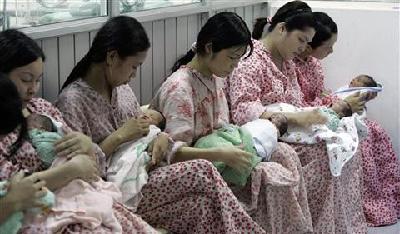
Approximately 6.6 billion people populate the earth today, with an estimated 3.7 billion living in Asia. But over the past 50 years, economic and social modernization in the region has been accompanied by a remarkable drop in birth rates. Sociologists, demographers and researchers are following the trend, and new research is providing more details to explain lower birth rates.
Many complex and subtle social and economic issues affect individual choices of when, or if to have children. But overall, basic trends are prevalent. A recent study by the East-West center in Hawaii focused on four prosperous Asian societies in Japan, Singapore, South Korea and Taiwan.
Sidney Westley, a Communications Specialist in the Research Program at the East-West Center, said, "In each of these societies, fertility has dropped very steeply, (which) I think (is) surprising demographers. It has fallen faster and fallen to a lower rate than people would probably have anticipated 15 or 20 years ago."
Over the past 20 years, the United Nations says the Asia-Pacific population has been growing, but at a slower rate compared to the rest of the world. Asian fertility fell by 39 percent in a 20-year period from the late 1960s while remaining above the population-replacement level of 2.1 children per woman. By 1990, nearly two-thirds of Asian countries had experienced declines of at least 25 percent.
Minja Choe is Senior Fellow in the Research Program in the area of Population and Health. "Most women like to get married and have about two children in their lives. But a lot of times they do not feel quite ready to do it and by waiting too long, they lose the chance to have two children or they lose the chance to get married," she said.
The study found that Asian women are putting off starting a family amid gains in education, employment and living standards, combined with dramatic breakthroughs in health and family-planning technology.
Bob Retherford, Coordinator of Population and Health Studies and a Senior Fellow, says those reasons are reflected in two main areas. "One is later marriage and less marriage. And the second major category is lower fertility within marriage," he said.
He adds a social shift in Asia has also had a significant impact. "And then there is an emergence of the idea that it is ok to enjoy single life without pressure to get married. That has become socially acceptable. That is a major value change," he said.
Although dating services have gained in popularity, Minja Choe says other social factors and patterns tend to lessen pregnancy opportunities. "Families do not spend much time together. A lot of men and women socialize with their men friends and women friends, not much with each other, especially married people," she said.
In Japan, the average age of marriage has risen to 29 for women and 31 for men. Caring for elderly parents, birth control, late marriage and settling into lifestyle without kids, and rapid economic changes that affect hours and careers all affect fertility in the survey area that also includes Singapore, South Korea and Taiwan.
Minja Choe also notes perhaps one big social difference between Asian and Western nations. "In these four countries, people do not have children outside marriage. That is unlike European countries and countries like America, Australia, New Zealand, other low fertility countries," she said.
With the declining birth trend in Asia, questions arise about how to address the issue, if at all. Economics play a large role. Working women have to give up earnings as they leave employment to have children. The cost of raising children then becomes a factor, especially if mothers have a difficult challenge returning to work.
Taiwan recently unveiled a $1.3 billion package of incentives for residents to have babies, giving new mothers at least $100 per month for the first two years of their child's life.
Sidney Westley of the East-West Center says governments can intervene, but as in the United States, Asian lawmakers must be very careful in their approach to employment issues involving new mothers.
"The (US) government gives you $500 a year tax break for each child. It is nothing compared to how much you are losing. They also have got to be very careful because if they force businesses to re-hire women after they have taken time to have babies or punish them in any way, then you are hurting women's employment. Then it starts looking unattractive to employ a woman rather than a man," she said.
Significant fertility declines have also been seen in other surveys conducted in China, Indonesia, Sri Lanka, and Vietnam. Strong family planning programs along with low mortality and high adult female literacy correlate with increased economic development in those nations.
Bob Retherford says a balance between individual desires and overall society will at some point have to be reached. "Ideally we want what is good for individuals to be consistent with what is good for society. But that is clearly not the case here. When you are talking about a steady state decline of population of about one third, or more actually in a generation every 30 years, that cannot persist. That is not good for society," he said.
United Nations figures show several countries in East and Southeast Asia (China, Japan, North Korea, South Korea, Thailand, Singapore, Vietnam) have already dipped below-replacement fertility levels. Researches do not expect the trends to change over the next several years.
(來源:VOA 編輯:崔旭燕)
